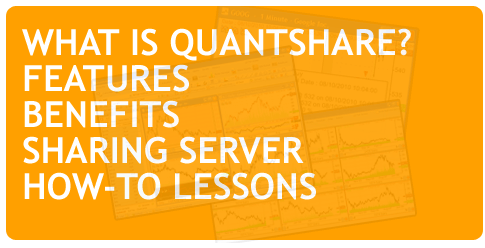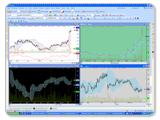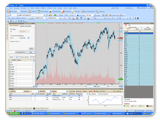But the question that begs an answer is: "Is the Russian Stock Market good enough for your investment?" To answer this question in details, we look at the different aspects of the Russian economy that any investor worth his salt should analyze first before he deems a market a viable investment. Russian Stock Market vs. Other Emerging Market The first thing I tend to look at when analyzing a marketís suitability is how well it fared compared to other economies. In this case, we need to compare Market Vectors Russia ETF (RSX) to other emerging countries ETF. 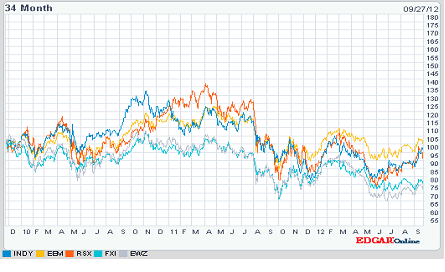 Gathering from the data shown above, it seems that emerging markets as a whole has performed badly following Eurozoneís crisis. However, the situation is not limited to emerging markets since the crisis has been weighing heavily in other developed countriesí economies as well. But market Vectors Russia ETF (RSX) is faring considerably better than iShares MSCI Brazil Index (EWZ) and iShares FTSE China 25 Index Fund (FXI). Historical Data It is also very important to look at how the Russian economy fared historically compared to other emerging markets. The chart below gives us an overview on how the Russian stock market performed before, during and after the critical years when the world was experiencing financial turmoil in 2008 in comparison to other emerging markets like China, India, Indonesia, Turkey and Brazil. 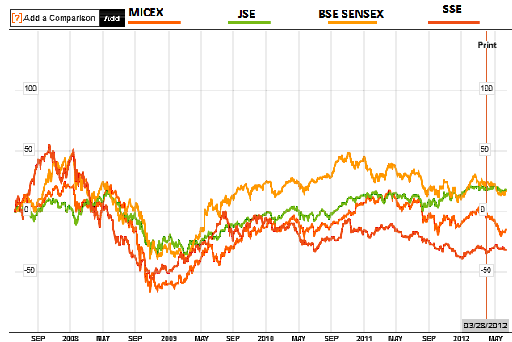 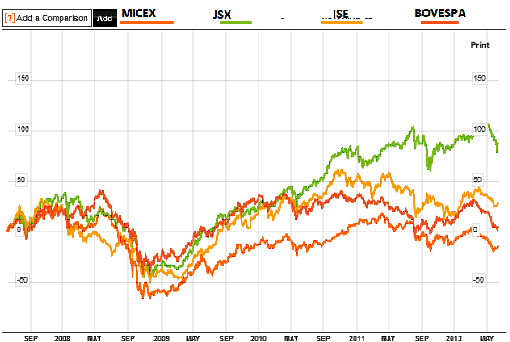 In the charts above, the major stock index of Russia Ė Moscow Interbank Currency Exchange hardly performed better than other emerging markets like Sao Paulo Stock exchange of Brazil (BOVESPA), Jakarta Stock Exchange of Indonesia (JSX), Istanbul Stock Exchange of Turkey (ISE), Johannesburg Stock Exchange of South Africa (JSE), and Bombay Stock Exchange of India (BSE SENSEX). However, it is important to note that Russia has fared better than Shanghai Stock Exchange of China (SSE) which took the hardest slump and slowest recovery during those years. Forward Earnings Forward earnings are projected or estimated earnings made by analysts. Some investors take this as a criterion in deciding whether a market is worth going into. If you are to use this as a criterion as well, it is important to keep in mind that these numbers are mere estimates and not a fact. Using this criterion, Russian market is considered cheap than its counterparts since itís forward earnings comes in at 4 times; while Chinaís forward earnings are at 9 times and both India and Brazilís forward earnings are at 15 times. Concern on governance as well as the lingering memories of Russia defaulting on its debt in 1998 could be the reason for this cheap valuation. What the Experts are Saying Wall Street and prominent analysts have certainly taken notice of the Russian stock market. According to Mr. Helfer, co-manager of HSBC BRIC Equity Fund, Russia provides the best value among BRIC (Brazil, Russia, India, China) countries. Global Chief Investment Strategist at BlackRock iShares, Russ Koesterich also said that Russian shares are trading very cheap; actually, itís even trading cheaper than Pakistani shares. Even famous investor, Jim Rogers has said that itís time to consider investing in Russia because its cheap market could provide interesting opportunities for investors. Factors that Can Affect Russian Economy One gnawing concern investing in Russia is the debt issue in Europe. Although the effect of this crisis is widespread and has affected global markets, itís still a worry for investors looking to make investments in a new market. Additionally, President Putinís reelection has brought about several accusations that the election might be rigged. Regardless if the accusation is true or not, politics still remains a concern for foreign investors. Of course, it helps that President Putin has promised a more open and friendly Russia for investors. But unless the political stability has been established, it still remains a risk for investors. Lastly, Russia happens to have one of the worldís largest oil and gas reserves. Rising crude prices are accountable for Russiaís favorable economic forecast. Thereís an attractive valuation for Russiaís energy arena with most of its customer based in Europe. And itís important to note that with a rebound on its economy, Russia has experienced a rise in its middle class who are more likely to spend their disposable income. Thatís why if youíre looking to invest in Russian stock market, itís important to take note on the outlook on commodities like oil and natural gases since these have widespread effect on overall Russian economy. Similarly, you need to be on your toes for political and Eurozoneís economic issues as these may pose some risks to your investments as well. comments powered by Disqus |

|
|
|
|


